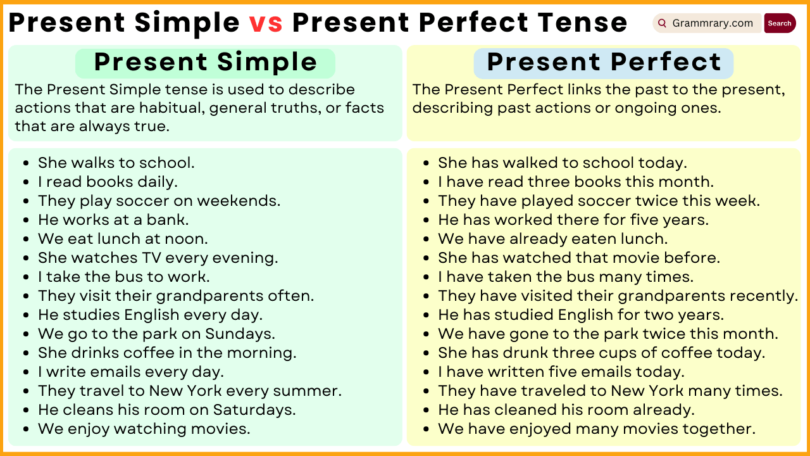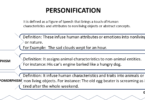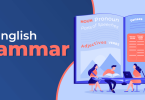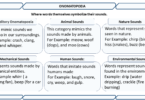Learning the difference between Present Simple vs Present Perfect tenses is important for learning English. The Present Simple is used for actions that happen regularly or facts that are always true, like “I eat breakfast every day.
The Present Perfect is used for actions that happened at an unspecified time in the past or have a connection to the present, like “I have eaten my breakfast.” Knowing when to use each tense helps in speaking and writing English more clearly. In this article, we will learn Present Simple vs Present Perfect tense examples to make learning easier and more effective.
What is the Present Simple Tense?
The Present Simple tense is used to describe actions that are habitual, general truths, or facts that are always true. Learn more about Present Simple Tense Examples
When to Use the Present Simple Tense
- Habits and Routines: Actions that happen regularly.
- Example: She drinks coffee every morning.
- General Facts and Universal Truths: Things that are always true.
- Example: The sun rises in the east.
- Scheduled Events: Fixed events in the near future.
- Example: The train leaves at 7 PM.
- States or Feelings: Verbs that express states rather than actions.
- Example: He likes chocolate.
Structure of the Present Simple Tense
| Subject | Base Verb (+s/es for third person singular) | Object/Complement |
|---|---|---|
| I | work | every day. |
| She | works | in an office. |
| They | play | football. |
- Positive: I read books.
- Negative: I do not (don’t) read books.
- Question: Do you read books?
What is the Present Perfect Tense?
The Present Perfect tense connects the past with the present. It is used to talk about actions or experiences that happened at an unspecified time before now or actions that started in the past and continue into the present.
When to Use the Present Perfect Tense
- Unspecified Past Actions: Actions that happened at some point before now.
- Example: I have visited Paris.
- Life Experiences: Talking about things you have done in your life.
- Example: She has never eaten sushi.
- Actions Continuing into the Present: Actions that started in the past and are still happening.
- Example: They have lived here for five years.
- Recently Completed Actions: Actions that just finished, often with words like just, already, or yet.
- Example: He has just finished his homework.
Structure of the Present Perfect Tense
| Subject | Auxiliary Verb (have/has) | Past Participle | Object/Complement |
| I | have | eaten | breakfast. |
| She | has | visited | Italy. |
| They | have | finished | their work. |
- Positive: I have seen that movie.
- Negative: I have not (haven’t) seen that movie.
- Question: Have you seen that movie?
Key Differences Between Present Simple vs Present Perfect
Understanding the differences between these two tenses can help you use them correctly. Here’s a table to summarize:
| Aspect | Present Simple | Present Perfect |
| Time Frame | Regularly, always, or scheduled events | Past actions with relevance to the present |
| Keywords | Always, often, sometimes, every day | Already, just, yet, ever, never, since |
| Focus | Habits, facts, and routines | Connection between past and present |
| Example | She walks to school every day. | She has walked to school this week. |
Common Mistakes and How to Avoid Present Simple vs Present Perfect
- Using the wrong auxiliary verb in Present Perfect:
- Incorrect: He have finished his work.
- Correct: He has finished his work.
- Mixing up time expressions:
- Incorrect: I have breakfast yesterday.
- Correct: I had breakfast yesterday. (Use Past Simple for specific past time.)
- Overusing the Present Perfect:
- Incorrect: I have known him last year.
- Correct: I knew him last year.
Present Simple vs Present Perfect Examples
| Present Simple | Present Perfect |
|---|---|
| I eat breakfast every morning. | I have eaten breakfast already. |
| She works at a hospital. | She has worked at the hospital for years. |
| They play football on weekends. | They have played football many times. |
| He studies English every day. | He has studied English for two years. |
| We visit our grandparents often. | We have visited them this month. |
| The sun rises in the east. | The sun has risen today already. |
| She drinks coffee every morning. | She has drunk her coffee now. |
| They travel during summer holidays. | They have traveled to many countries. |
| He walks to school daily. | He has walked to school this week. |
| We go to the park every Sunday. | We have gone to the park twice today. |
| I read books every night. | I have read three books this month. |
| She cooks dinner every evening. | She has cooked dinner for the family. |
| He listens to music daily. | He has listened to that song before. |
| We clean the house every weekend. | We have cleaned the house today. |
| They watch movies on Fridays. | They have watched that movie already. |
| He writes emails every day. | He has written an important email today. |
| She calls her friend often. | She has called her friend just now. |
| We exercise regularly. | We have exercised a lot this week. |
| The train arrives at 9 a.m. | The train has already arrived. |
| They enjoy playing games together. | They have enjoyed many games this year. |
Practice Exercises
Fill in the blanks with the correct tense (Present Simple or Present Perfect):
- She ______ (go) to the gym every Monday.
- I ______ (never/try) sushi before.
- They ______ (live) in this city for ten years.
- He ______ (finish) his homework just now.
- The Earth ______ (revolve) around the Sun.
Answers:
- goes
- have never tried
- have lived
- has finished
- revolves
Tips for ESL Learners
- Learn Signal Words: Words like every day (Present Simple) and since or already (Present Perfect) can help you choose the correct tense.
- Practice Regularly: Use both tenses in your daily conversations to get comfortable.
- Focus on Context: Think about the time frame and purpose of your Sentence.
Learn also:










